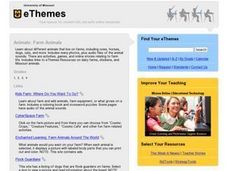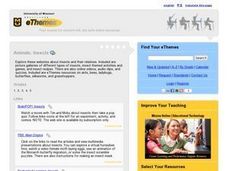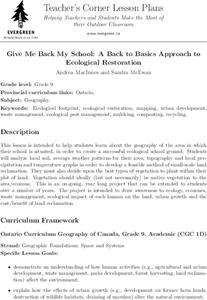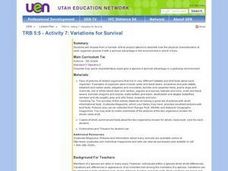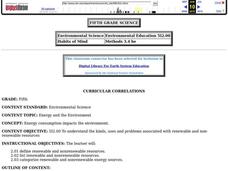Curated OER
Animals: Farm Animals
Students examine the different types of animals that live on a farm. They participate in online games and activities to help them explore the different types of farm animals.
Curated OER
Animals: Insects
Students use the Internet to examine insects and their relatives. They participate in online games and discover insect recipes.
Curated OER
Give Me Back My School: A Back to Basics Approach to Ecological Restoration
Ninth graders research local geography to create successful, ecological school landscaping. They determine soil type, average weather patterns and temperature graphs and use the information to select ideal plants and plant maintenance...
Curated OER
Bay B C's
In this unit of lessons, students examine the Chesapeake Bay area. Students learn what lives here and how humans are affecting the area.
Curated OER
Utah's Amazing Ecosystems
Middle schoolers investigate the various ecosystems of Utah. They define key vocabulary terms, conduct research, and create an informational report on a selected ecosystem of Utah.
Curated OER
Variations for Survival
Fifth graders examine two related organisms that live in different environments and compare how the physical characteristics of each organism provided it with survival advantages unique to its own environment.
Curated OER
You Can Depend on Me
Young scholars identify how they depend on others, and examine and discuss the images on the California Quarter Reverse. They view and discuss images of various habitats, complete a Habitat Research worksheet, and create a habitat diorama.
Curated OER
Amazon Rainforest: You Won't Find George in This Jungle
Students identify locations of rainforests, compare/contrast layers of the rainforest, construct and interpret maps and graphs, recognize relationships between man and the environment, and write about an imaginary walk in the rainforest.
Curated OER
Birds of the Northeast
Students identify several common birds through field observations, preserved specimens and personal experience. They classify the species and choose one to research. They draw a migration map and participate in a project that benefit...
Curated OER
Landscape Photography
Students photograph the school landscape and create photographic displays from the pictures they take. They discuss the visual characteristics of the school grounds. Working in pairs the role-play as camera and photographer and write...
Curated OER
Grizzly Hibernation
Students explain why and how grizzlies hibernate. They make a den using cardboard boxes. They write a story told from a new-born grizzly.
Curated OER
Design a Problem-Solving Invention
Students identify a problem that can be solved with a simple invention. They design an invention.
Curated OER
Urban Rivers
Students discuss how urban rivers have shaped the region in which they live. They research river geology and ecology. They examine a case study of life and living along the Delaware River.
Curated OER
Add'm and Eve in the Garden
Young scholars research and design five different shaped raised beds for the school garden. In small groups, they conduct Internet research, measure and create a cost analysis for the construction and design, and submit their plans to...
Curated OER
Invasion of the Habitat Snatchers!
Fourth graders investigate invasive plants found in a park or school environment and acknowledge the problems caused by the plants. They describe 4 methods of control of invasive plants.
Curated OER
Historic Cemeteries: "History Written in Stone"
Students examine grave markers in their local community. They identify how past generations contributed to life in their town. They discuss their feelings about death and how one is to act at a cemetary.
Curated OER
Watch the Birdie
Students complete a six-week unit on North American birds. They conduct research, develop fact sheets, create labeled bird drawings, write a dictionary of bird vocabulary words, create a Concentration game, and observe birds in their...
Curated OER
Energy and the Environment
Fifth graders define terms associated with renewable and nonrenewable resources. They identify materials that are renewable and nonrewable. They categorize a list into the correct type of resource.
Michigan Sea Grant
Water Quality
Learners observe water samples and measure the samples' water quality. Students develop their own criteria for measuring water quality and test for temperature, acidity, oxygen levels, turbidity, conductance, sediment and hardness.
Curated OER
Native vs. Non-native Species: Who Will Win?
Students examine non-native species and the problems they have caused in the waters of the Chesapeake Bay. They create a "Wanted" poster for one of the species. They describe the effects of non-native species on the schoolyard species.
Curated OER
Pyramid of Biomass
Students interpret data to demonstrate biomass and number pyramids. They use information to draw conclusions and examine an example of biological magnification.
Curated OER
Home Sweet Home
Students examine the animals that live in trees. They identify their sounds, footprints and droppings. They draw pictures of the animals as well.
Curated OER
Discovering New Species
Young scholars identify animals observed by Lewis and Clark while evaluating the animal's habitat and describing the animal's behavior. Students construct a food web mobile to illustrate the animal's position in the food web in the 19th...
Curated OER
LIONS and TIGERS and BEARS. . .Oh My! Animals of Connecticut and the World
Students identify and list the different types of pets owned by the children in the class.
They graph the total number of each type of pet owned. They draw or cut-out a picture of an animal. Using the materials listed above, the children...
Other popular searches
- Wildlife Conservation
- Wildlife Management
- Wildlife Refuges
- Wildlife Departments
- Mammals (Wildlife)
- City Wildlife
- Aquatic Wildlife
- African Wildlife
- Animal Wildlife Conservation
- Maine Wildlife
- Arctic Wildlife
- Antarctica Wildlife


